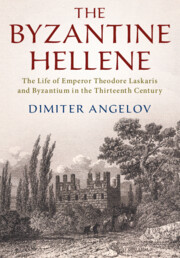Book contents
- The Byzantine Hellene
- The Byzantine Hellene
- Copyright page
- Dedication
- Contents
- Illustrations
- Maps
- Tables
- Acknowledgments
- List of Historical Figures
- List of Rulers in Byzantium and Beyond
- Author’s Note
- Introduction
- 1 Byzantium in Exile
- 2 “The Holy Land, My Mother Anatolia”
- 3 “I Was Raised as Usual for a Royal Child”
- 4 Pursuit of Learning
- 5 Power-Sharing
- 6 Friends, Foes, and Politics
- 7 Elena and the Embassy of the Marquis
- 8 Sole Emperor of the Romans
- 9 The Philosopher
- 10 The Proponent of Hellenism
- Epilogue
- Notes
- Book part
- Bibliography
- Index
Introduction
Published online by Cambridge University Press: 15 July 2019
- The Byzantine Hellene
- The Byzantine Hellene
- Copyright page
- Dedication
- Contents
- Illustrations
- Maps
- Tables
- Acknowledgments
- List of Historical Figures
- List of Rulers in Byzantium and Beyond
- Author’s Note
- Introduction
- 1 Byzantium in Exile
- 2 “The Holy Land, My Mother Anatolia”
- 3 “I Was Raised as Usual for a Royal Child”
- 4 Pursuit of Learning
- 5 Power-Sharing
- 6 Friends, Foes, and Politics
- 7 Elena and the Embassy of the Marquis
- 8 Sole Emperor of the Romans
- 9 The Philosopher
- 10 The Proponent of Hellenism
- Epilogue
- Notes
- Book part
- Bibliography
- Index
Summary
One year before he passed away at the age of thirty-six, the subject of this biography sent a polemical letter to his teacher and spiritual father. The letter ended on a note of hope that his arguments “would be judged by future generations.”1 The author called for the judgment of history because he was conscious of criticism of him as a public personality. Throughout his life, he had observed with rising concern the vilification of rulers before and after their deaths. The inevitable lot of the individual vested with royal authority, he reasoned, was “to be the target of reproach.”2 He had a good reason to fear that he would suffer the same fate, for his policies had upset many among the ruling elite and had troubled his former teacher, the addressee of the letter. He wished his lone voice to be heard through the ages and intended his writings to become a lasting monument. “I know,” he wrote over a decade earlier, “that in this way I will gain an icon of remembrance before the eyes of the future generations and a clearing of my name.”3
- Type
- Chapter
- Information
- The Byzantine HelleneThe Life of Emperor Theodore Laskaris and Byzantium in the Thirteenth Century, pp. 1 - 12Publisher: Cambridge University PressPrint publication year: 2019

